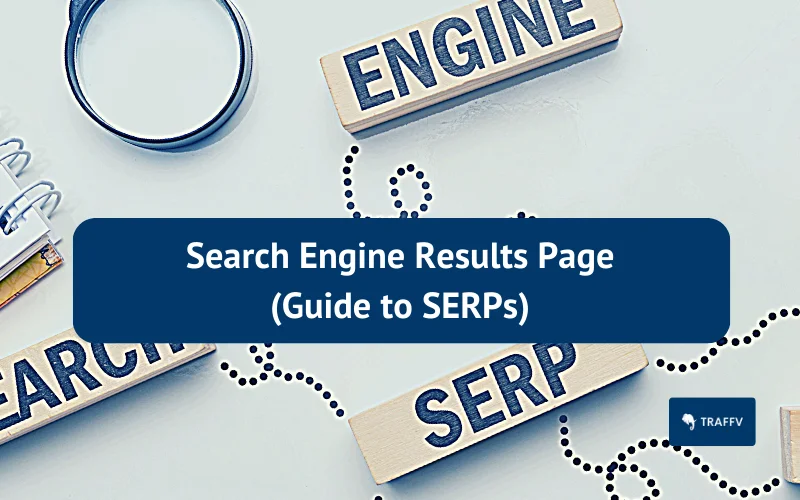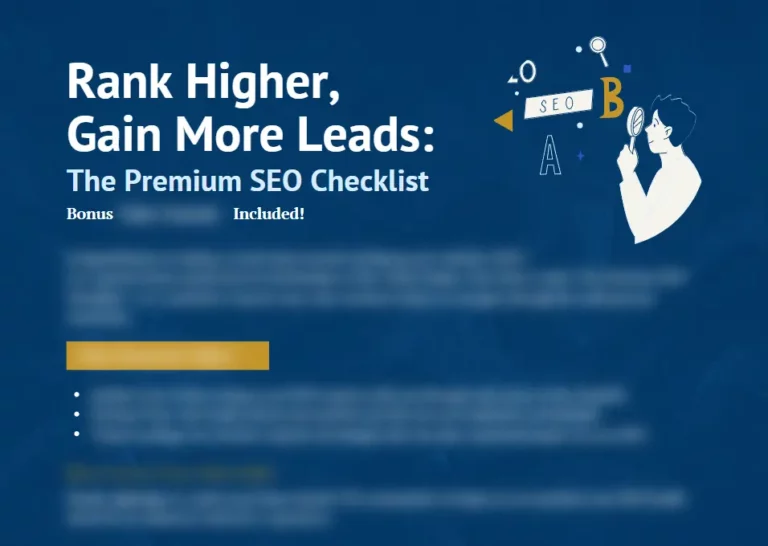Did you know that the way your website appears on search engine results pages (SERPs) can make or break your online presence?
Understanding SERPs is crucial for driving organic traffic, increasing visibility, and ultimately attracting potential customers.
In this post, we’ll explore the ins and outs of SERPs, the various components involved, and how to optimize your website for success in the ever-changing world of search engine optimization (SEO).
Buckle up, and let’s dive in!
TL:DR
- Search Engine Results Pages (SERPs) are generated by search engines based on algorithms to create a customized experience for users.
- Optimizing SERPs is essential for online success, as it increases the likelihood of potential customers discovering your website and can result in higher revenue and engagement.
- An effective SEO strategy combines on/off page optimization with targeting specific SERP features to improve rankings, drive organic traffic & attract customers.
The Essence of SERPs
SERPs, or Google SERPs, are the backbone of any successful online presence.
They are the pages generated by search engines like Google, Bing, and Yahoo in response to a user’s query.
These pages consist of organic search results, paid ads, and various SERP features such as featured snippets, knowledge panels, and local packs.
With Google dominating more than 80% of the market share, understanding how SERPs work and how to optimize your website can make a significant difference in your online visibility and traffic.
What are SERPs?
When a user types a query into a search engine, a search engine results page (SERP) is generated with a list of Google search results, including organic listings, paid ads, and additional features such as images, news articles, or even tweets.
These SERP features are based on the search engine’s algorithms, which analyze various factors such as relevance, user data, and the type of search query to create a customized experience for the user.
Search engine algorithms are constantly evolving to provide users with the most relevant and up-to-date information.
Why SERPs matter?
Understanding and optimizing for SERPs is crucial for your online success.
The higher your website ranks on SERPs, the more likely it is to be discovered by potential customers, as research shows that 75% of users never scroll past the first page of search results.
To achieve the top of the list, it’s essential to focus on improving your website’s SEO strategies.
By optimizing your website for both organic and paid search results, you increase your chances of attracting more traffic, which in turn can lead to higher revenue and customer engagement.
The Mechanics of SERPs
Creating the perfect SERP is no easy feat for search engines.
They use complex algorithms to analyze and rank web content based on a multitude of factors, such as relevance, user data, and search history.
These algorithms are constantly being updated and tested to provide the best possible experience for search engine users, making the competition for top rankings fierce and complicated.
Search engine optimization (SEO) is the practice of optimizing web content to improve its visibility.
How search engines create SERPs
Search engines like Google use algorithms to analyze and rank web content in real-time, tailoring the SERPs for each individual user.
These algorithms take into account various factors such as:
- Expertise
- Authority
- Trustworthiness (E-A-T)
- Keywords
- Content relevance
- Website material
- Backlinks
- User location, language, and device
The goal is to provide the most pertinent and high-quality search results for the user’s query.
Factors affecting SERP rankings
Several factors can influence your website’s rankings on SERPs.
Some of the key SEO ranking factors include:
- Relevance: how well your content matches the user’s query
- Location: search engines take into account the user’s physical location to display locally relevant results
- Search history: affects the personalization of SERPs based on the user’s past searches
- Content quality: ensures that the content is useful and engaging for users.
Organic vs. Paid Search Results
While both organic and paid search results play a crucial role in driving traffic and improving online visibility, they differ in how they are generated and displayed on SERPs.
Organic search results are determined by search engine algorithms and SEO practices, whereas paid search results are ads that appear at the top or bottom of SERPs.
Understanding the differences between these two types of search results is essential for effectively optimizing your website for both and reaping the benefits they offer.
Organic search results
Organic search results, also known as organic results, are listings that are ranked based on search engine algorithms, which take into account factors such as relevance, content quality, and user data. Higher rankings in organic search results can lead to increased visibility, traffic, and ultimately, more potential customers.
To improve your website’s organic rankings, it’s crucial to implement SEO best practices, such as optimizing metadata, using unique URLs, and incorporating keywords in headings.
Paid search results
Paid search results, on the other hand, are advertisements that appear at the top or bottom of search engine result pages.
These ads operate on a Pay-Per-Click (PPC) basis, with advertisers bidding on keywords and paying the search engine for each click they receive.
Paid search results, such as Google Ads, can drive significant traffic and potential customers, especially for transactional queries, where research indicates that approximately 65% of clicks occur on paid ads.
Types of Search Queries
Search queries can be classified into three main categories: navigational, informational, and transactional. Each type of query affects the SERP features displayed, as well as the strategies required to optimize for them.
Understanding these query types and targeting your content accordingly can help you attract the right audience and improve your overall visibility on SERPs.
Navigational queries
Navigational queries are searches for a specific website or web page, such as a brand name or product name.
Ranking for navigational keywords can help drive traffic to your site, as users are already looking for your brand or product through other search engine platforms.
To capitalize on navigational queries, consider investing in ads for keywords related to your business, such as your brand name.
Informational queries
Informational queries are searches for information, such as background facts about a topic or instructions on how to perform a task.
Creating content that addresses these queries is crucial for attracting users and increasing brand awareness.
Make sure to produce high-quality, informative content that answers users’ questions and provides value, as this can help improve your website’s visibility on SERPs for informational queries.
Transactional queries
Transactional queries are searches with the intent to purchase a product or service.
These queries have high revenue potential and often attract paid ads, which can drive significant traffic to your site.
To capitalize on transactional queries, consider investing in paid ads for keywords related to your products or services, as well as optimizing your website for organic search results.
Breaking Down SERP Features
SERP features are additional elements on search engine results pages that provide users with more information and can impact organic traffic.
Some common SERP features include featured snippets, knowledge panels, and local packs.
Understanding and targeting these features can help improve your website’s SEO on SERPs and drive more traffic to your site.
Featured snippets
Featured snippets are short sections of content displayed at the top of SERPs, providing quick answers to user queries.
They can appear in various formats, such as paragraphs, lists, or tables, and are designed to give users a concise answer without having to click through to a website.
To achieve a featured snippet, ensure your website is already ranking on the first page of search results, and create comprehensive content that includes all relevant keywords.
Knowledge panels
Knowledge panels are boxes that appear on the right side of search results, displaying targeted information about specific topics or people.
They are generated from the Knowledge Graph and rely on data from reliable sources such as Wikipedia and Wikidata.
To create a knowledge panel for your business, follow these steps:
- Ensure your website is included in the Knowledge Graph.
- Provide accurate, up-to-date information about your business on your website.
- Update your business information in other online directories.
By following these steps, you can increase your chances of having a knowledge panel for your business.
Local packs
Local packs are featured results that show nearby businesses related to a user’s query, including a map and contact information.
They are generated from the Google My Business directory and provide users with quick access to local businesses that match their search criteria.
To optimize your website for local packs, ensure your Google My Business listing is complete and accurate, and implement local SEO strategies to improve your visibility in local search results.
SEO Strategies for SERP Success
Optimizing your website for search engine results pages requires a mix of on-page and off-page SEO strategies, as well as targeting specific SERP features.
By implementing these techniques, you can improve your website’s rankings on SERPs, drive more organic traffic, and ultimately attract more potential customers.
On-page SEO involves optimizing the content and structure of your website, such as optimizing titles.
On-page SEO techniques
On-page SEO techniques involve optimizing various elements of your website, such as metadata, unique URLs, and incorporating keywords in headings.
Other important on-page factors include creating high-quality, engaging content, optimizing images, and ensuring your website is mobile-friendly.
By focusing on these on-page elements, you can improve your website’s visibility in search engine results and attract more organic traffic.
Off-page SEO strategies
Off-page SEO strategies involve activities outside of your website that can improve your search engine rankings.
These strategies include:
- Link building
- Social bookmarking
- Content marketing
- Guest posting
- Influencer outreach
By building high-quality backlinks, promoting your content on social media platforms, and collaborating with influencers in your industry, you can increase your website’s authority, leading to improved rankings in search engine results pages.
Targeting SERP features
Targeting SERP features, such as featured snippets and knowledge panels, can increase your website’s visibility on search engine results pages and drive more traffic to your site.
To target these features, you can:
- Optimize your content with relevant keywords
- Create comprehensive content that answers user questions
- Ensure your website is included in the Knowledge Graph
By following these strategies, you can improve your chances of appearing in SERP features and attracting more visitors to your site.
By focusing on these strategies, you can increase the likelihood of your website appearing in these prominent SERP features and attract more organic traffic.
Enhance Visibility and Climb the SERP Ladder
Understanding SERPs and implementing effective SEO strategies is crucial for driving organic traffic, increasing visibility, and attracting potential customers.
By collaborating with an SEO company, you can leverage their expertise to achieve greater success in the competitive world of SERPs.
The journey to SERP success may be challenging, but with the right strategies and a dedicated approach, your online presence can thrive.
Frequently Asked Questions
Why is SERP important for SEO?
SERPs are an essential factor in SEO because they determine website ranking, exposure, clicks, traffic and revenue.
How do SERPs work?
Search Engine Result Pages (SERPs) are the pages that are displayed by a search engine after a user submits a search query.
SERPs include organic results, ads, and other features such as Featured Snippets, Sitelinks, and more.
Paid search and pay-per-click ads may also appear on a SERP.
What is an example of a SERP?
When you search on Google, the page which shows the top ten results is an example of a Search Engine Results Page (SERP).
It may contain additional features such as Featured Snippets, Knowledge Panels, video carousels and image packs.
What does serp stand for?
SERP stands for ‘Search Engine Results Page’, which is the list of webpages that are presented in response to a user’s search query.
SERPs typically include organic results and paid ads, allowing users to find what they need from both free and paid sources.
What is the difference between organic and paid search results?
Organic search results are determined by search engine algorithms and SEO practices, while paid search results are advertisements that appear at the top or bottom of search engine results pages that can be purchased by advertisers.




